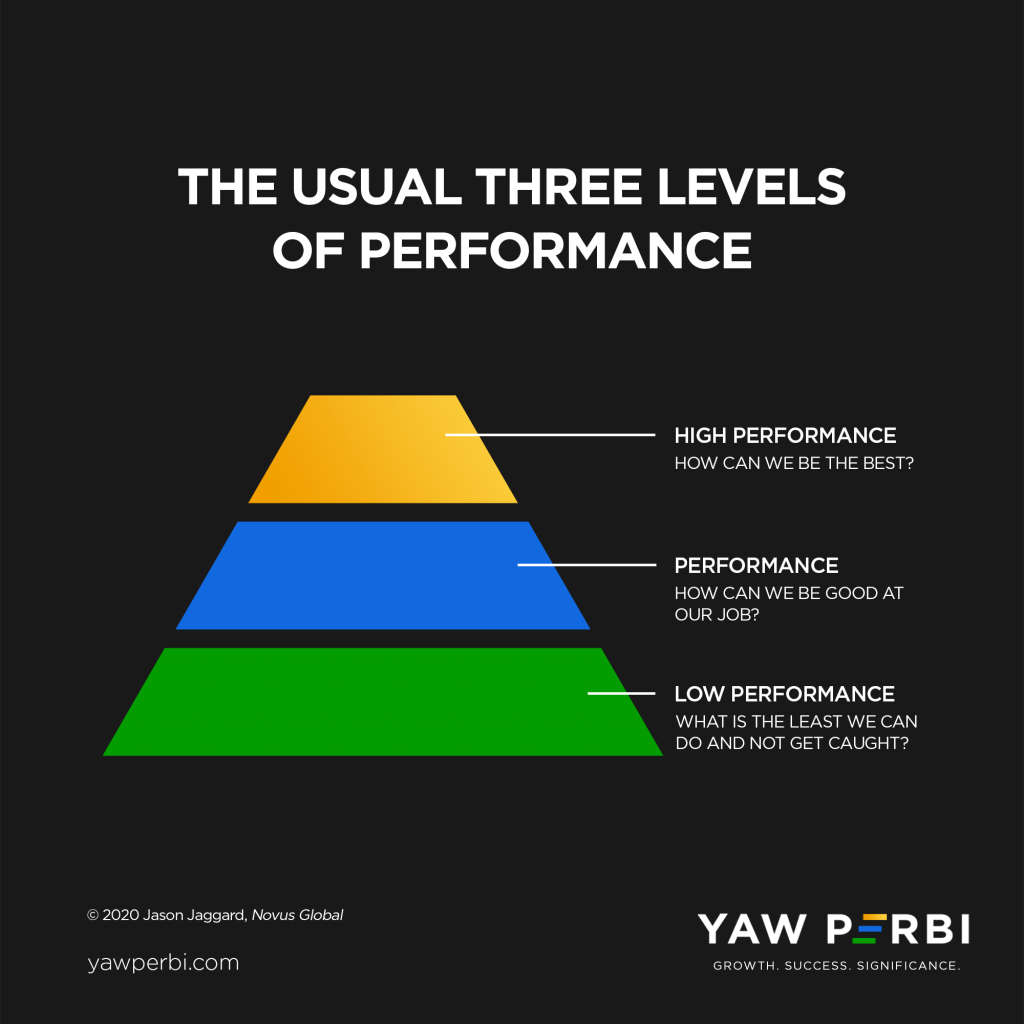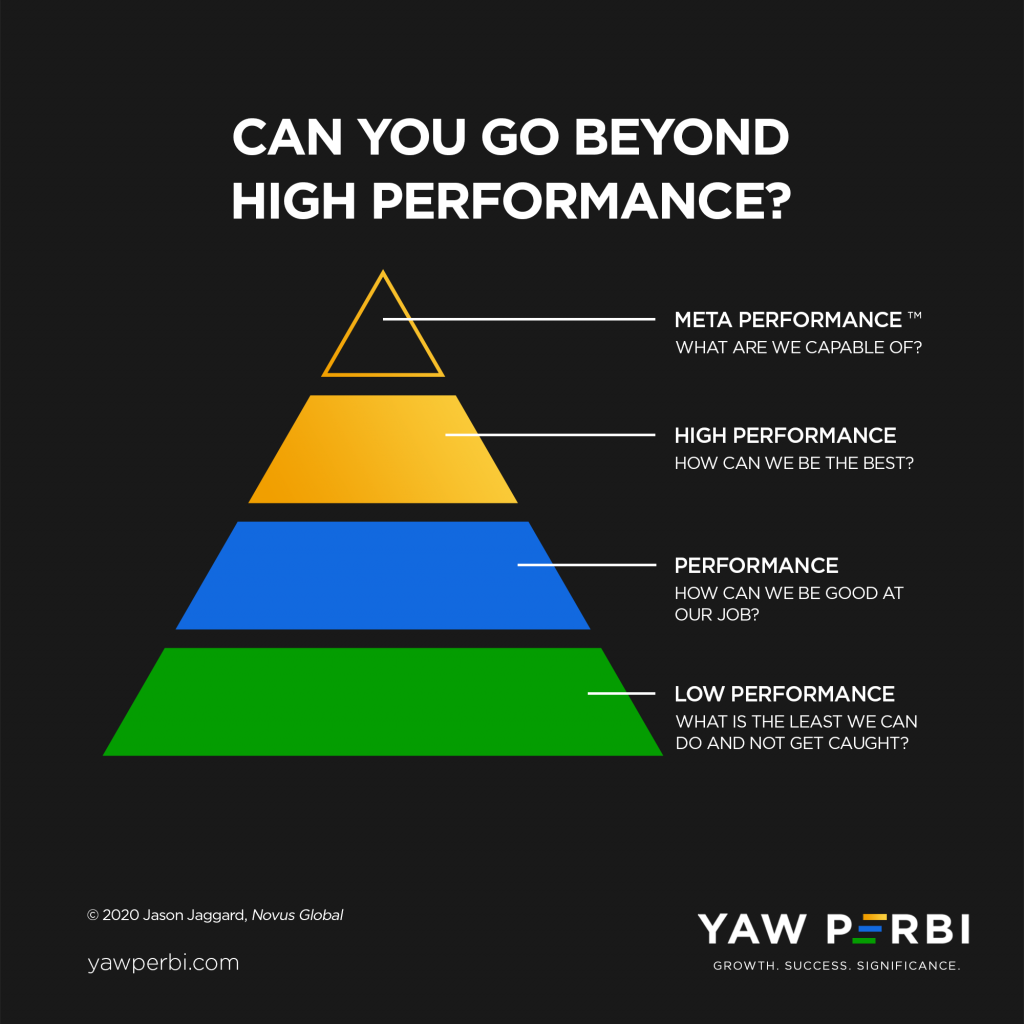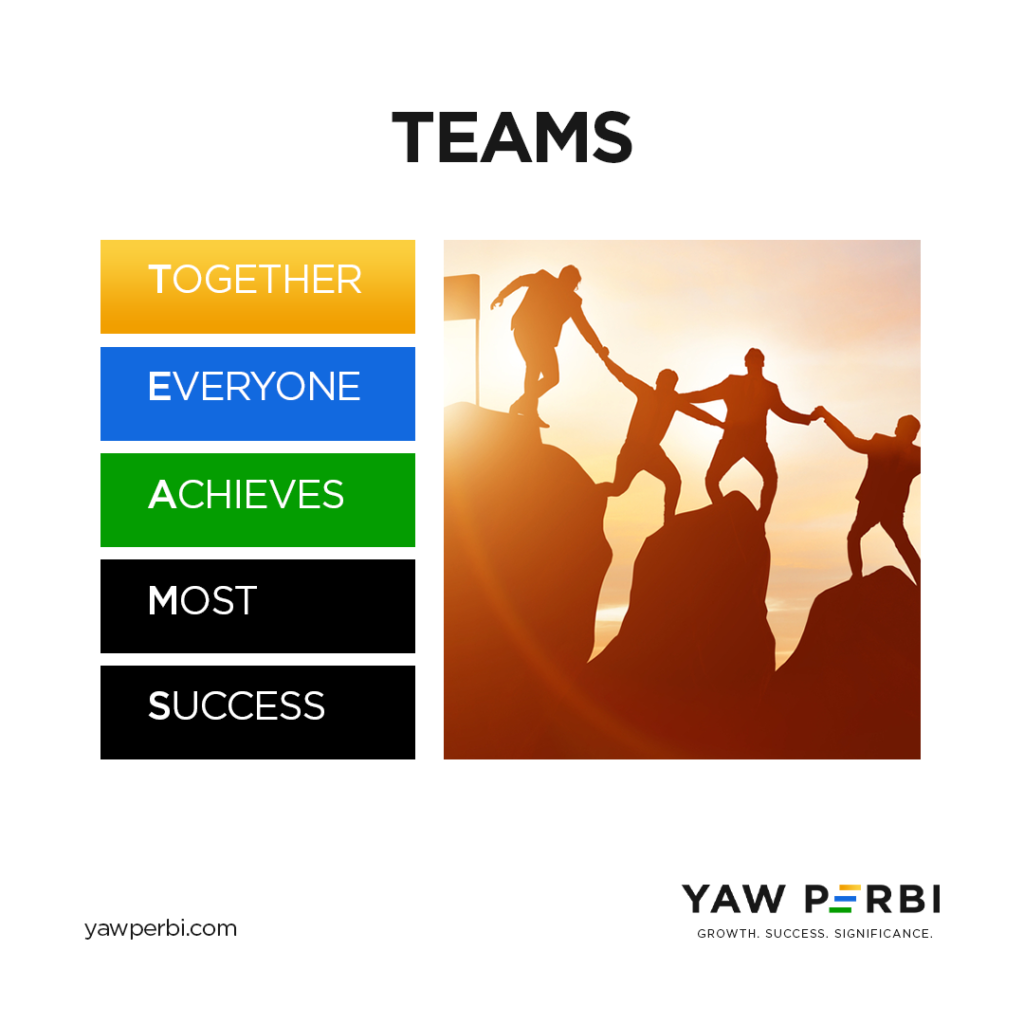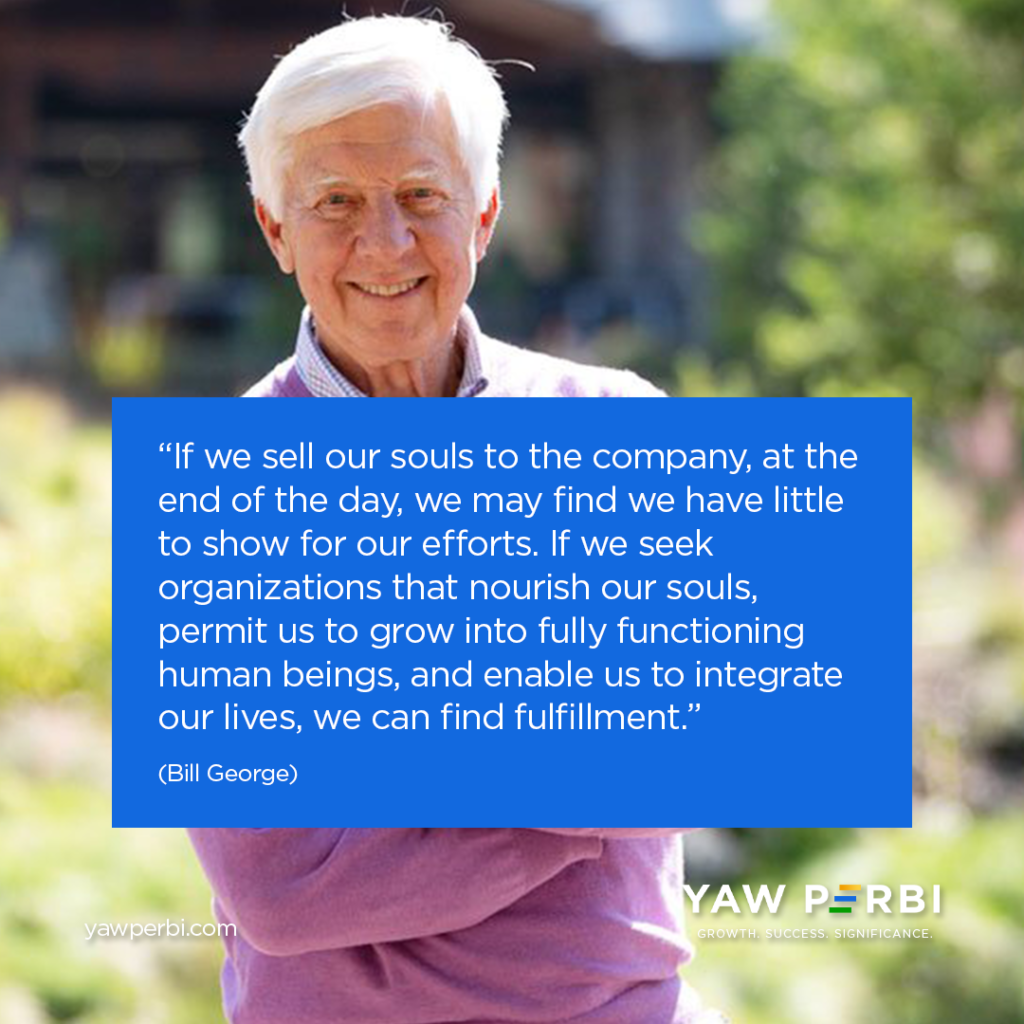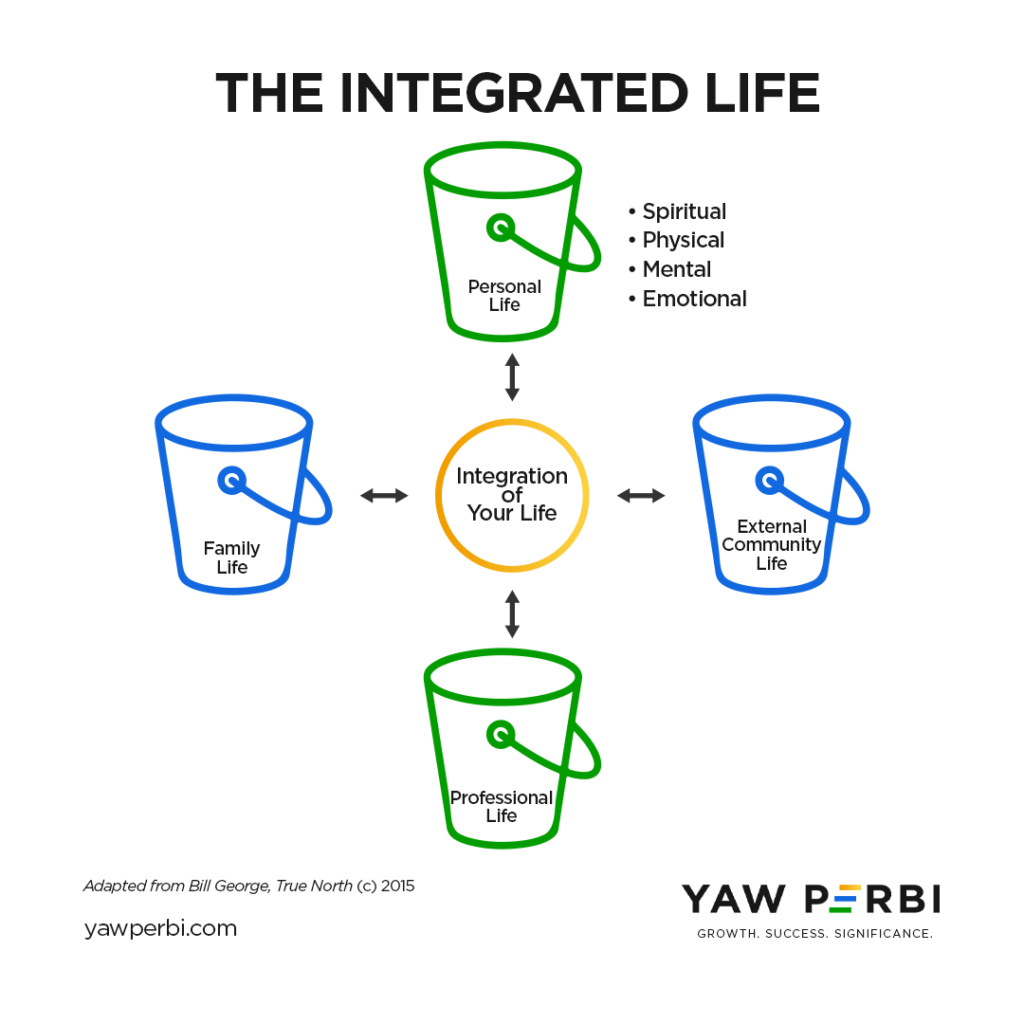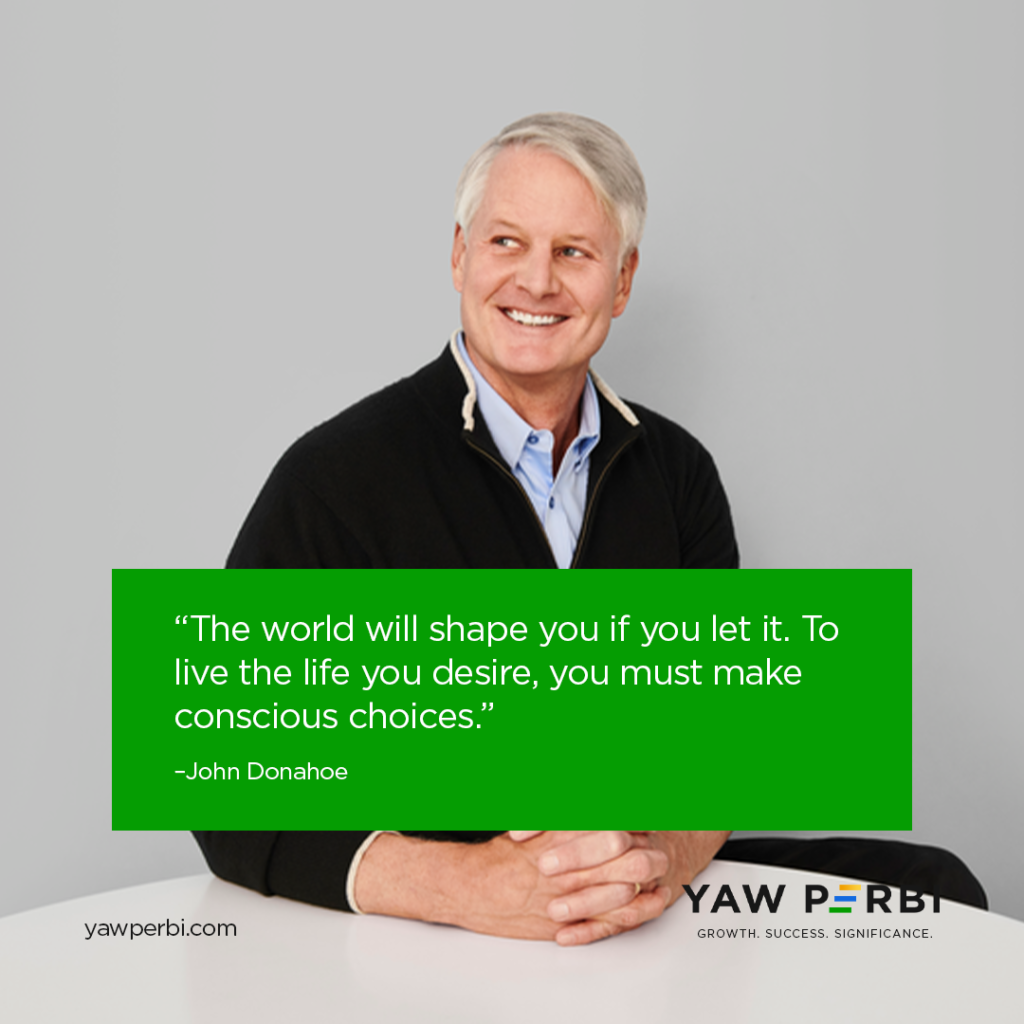
“Can You Go Beyond High Performance?”
“Can you go beyond high performance?” That’s a penetrating question Jason Jaggard, founder and CEO of the executive coaching firm Novus Global, asks in his powerful and popular article that bears that title. My good friend and StrengthsFinder coach, Dan Leffelaar, who is COO and partner at Novus Global, had exposed me to the company after he joined. Later he would introduce me to one of their very competent coaches, Joseph Thompson. It was Joseph who then drew my attention to this article even before we would have our first formal coaching session. By the way, I’ve said it before and it’s worth repeating, never hire a coach who doesn’t have a coach!
DIFFERENTIATION–OR WHATEVER YOU CALL IT
It is not uncommon for managers to categorize workers in the marketplace into three: low performers, performers and high performers. Over a decade ago, I remember reading about this idea from long time General Electric CEO Jack Welch’s book Winning. He called it differentiation, separating the sheep from the goats. According to Jack, differentiation is a process that requires managers to assess their employees and separate them into three categories in terms of top performance: top 20 percent, middle 70, and bottom 10. Then—and this is key—it requires managers to act on that distinction.
Whatever different percentages one uses to divide the three levels (and some just use the Pareto principle to divide the top 20% from the remaining 80%), the questions the people in each band ask themselves that result in their kind of performance are intriguing:
- Low Performers–“What is the least we can do to get by–and not get caught?”
- Performers–“How can we be good at our job?”
- High Performers–“How can we be the best?”
Often the morale of the story is “be the best,” be a high performer. Or, in the precious words of my dad’s alma mater (in Latin), Vel primus vel cum primis. To wit: either the first or with the first. But that is precisely the problem. High performers typically stop growing because they feel (or are made to feel) they are the best, or among the best, and have hit their peak when that is far from the truth! That’s the challenge of comparing ourselves to others instead of to our own potential. Don’t forget the saying that “in the land of the blind, the one-eyed man is king.” What is high performance about one eye just because everyone else you’re compared with is blind?
In fact, not only does Jason point out two common mistakes of high performers here but Novus Global as a practice firmly believes “attracting and retaining high-performers is a mistake and doing so creates a predictable set of problems.” You probably have met a lot of high performers who are still unhappy. Barring greed and envy, could Abraham Maslow’s observation be the cause? “If you plan on being anything less than you are capable of being, you will probably be unhappy all the days of your life.”
META-PERFORMANCE
So “can one go beyond high performance?” remains the question. “What comes after high performance?” I’m glad you asked. “If your team doesn’t have a clear and compelling answer to the question “What comes after high performance?” then you absolutely have an unnecessary cap on the possibilities of your leadership and the impact of your organization,” says Jason. The answer lies in a word he’s coined: meta-performance. And this is “meta” is not like “meta-data” but “meta” as in “metamorphosis,” like a caterpillar transforming into a butterfly. A meta-performer isn’t committed to being the best (“how dull,” Jason says)… a meta-performer is committed to constantly exploring capabilities.
Unlike “What is the least we can do to get by–and not get caught?” (Low Performers), “How can we be good at our job?” (Performers) or “How can we be the best?” (High Performers), Meta-Performers ask themselves, “What are we capable of?” That is a potent question in and of itself, but to process that with a competent and caring coach is even more powerful!
I often say to people, I may not have been the best of medical students (I was a low performer) but I was a very good doctor (high performer). But as good a doctor as I was, the question of what I was capable of sent me on a totally different trajectory from my peers, from authoring books and motivational speaking through military experience and peacekeeping with the United Nations, to pastoring, restarting life as a Canadian immigrant and becoming CEO of a number of non-medicine related ventures, some with a budget of a few million dollars.
Meta-performance is akin to what my mentor John C. Maxwell calls The Law of the Rubber Band: Growth Stops When You Lose the Tension Between Where You are and Where You Could Be. The meta-performance life happens somewhere between feeling ‘just right,’ taut enough to be best at tying things up, to tearing up because we fail to embrace our God-given limits. Often times, we are poor judgers of thse book ends, and having a discerning coach to assist on this journey is vital.
“IMPOSSIBLE” ACCORDING TO WHO?
In what area(s) of your life have you lost your stretch and settled? Create some specific means for stretching in these areas of your life. Go back to your 2021 goals and ensure they’re not only S.M.A.R.T. but that they also STRETCH. Remember, “Only a mediocre person is always at his best,” saysW. Somerset Maugham, putting things in a way that hits home, hard. “Ouch,” says the best performers.
Walt Disney used to say, “It’s kind of fun to do the impossible.” I know the feeling, a little bit. Nelson Mandela was right: “It always seems impossible until it’s done.” I find it not only a powerful meta-performance question to ask “What am I capable of?” but also in line with that to inquire, “What sort of person must I become to be capable of that?” Then with Almighty God’s help, “just do it,” do the “impossible.”

The Little Cow
The first time I heard the story about the little cow, it was from the lips of a millionaire. Gathered in the conference room of some hotel in mid-town Montrèal, this man who had made his money from the financial services industry was urging us on to let go of our little cows, mainly JOBs (which people in his circle called “Just Over Broke”) and go chasing those dreams that will stretch us, pain us but in the end be most gratifying.
Recently, I decided to search online for the story and finally found it, author unknown. Here goes.
The Little Cow – Unkown Author
A master of Wisdom was traveling through the countryside with his apprentice when they came to a small, disheveled shack on a meagre piece of farmland. “See this poor family,” said the Master, “Go see if they will share with us their food.”
“But we have plenty,” said the apprentice.
The master said, “Do as I say.”
The obedient apprentice went to the home. The good farmer and his wife, surrounded by their seven children, came to the door. Their clothes were dirty and in tatters.
“Fair greetings,” said the apprentice, “My Master and I are sojourners and want for food. I’ve come to see if you have any to share.”
The farmer said, “We have little, but what we have we will share.” He walked away, and then returned with a small piece of cheese and a crust of bread. “I am sorry, but we don’t have much.” The apprentice did not want to take their food but did as he had been instructed. “Thank you. Your sacrifice is great.”
“Life is difficult,” the farmer said, “but we get by. And in spite of our poverty, we do have one great blessing.”
“What blessing is that?” asked the apprentice.
“We have a little cow. She provides us milk and cheese, which we eat or sell in the marketplace. It is not much but she provides enough for us to live on.”
The apprentice went back to his Master with the meagre rations and reported what he had learned about the farmer’s plight. The Master of Wisdom said, “I am pleased to hear of their generosity, but I am greatly sorrowed by their circumstance. Before we leave this place, I have one more task for you.”
“Speak, Master.”
“Return to the shack and bring back their cow.”
The apprentice did not know why, but he knew his Master to be merciful and wise, so he did as he was told. When he returned with the cow, he said to his Master, “I have done as you commanded. Now what is it that you would do with this cow?”
“See yonder cliffs? Take the cow to the highest crest and push her over.”
The apprentice was stunned. “But Master…”
“Do as I say.” The apprentice sorrowfully obeyed. When he had completed his task, the Master and his apprentice went on their way.
Over the next years, the apprentice grew in mercy and wisdom. But every time he thought back on the visit to the poor farmer’s family, he felt a pang of guilt. One day he decided to go back to the farmer and apologize for what he had done. But when he arrived at the farm, the small shack was gone.
Instead there was a large, fenced villa.
“Oh no,” he cried, “The poor family who was here was driven out by my evil deed.” Determined to learn what had become of the family, he went to the villa and pounded on its great door. A servant answered the door.
“I would like to speak to the master of the house,” the apprentice said.
“As you wish,” said the servant. A moment later a smiling, well-dressed man greeted the apprentice.
“How may I serve you?” the wealthy man asked.
“Pardon me, Sir, but could you tell me what has become of the family who once lived on this land but is no more?”
“I do not know what you speak of,” the man replied, “my family has lived on this land for three generations.”
The apprentice looked at him quizzically. “Many years ago I walked through this valley, where I met a farmer and his seven children. But they were very poor and lived in a small shack.”
“Oh,” the man said smiling, “that was my family. But my children have all grown now and have their own estates.”
The apprentice was astonished. “But you are no longer poor. What happened?”
“God works in mysterious ways,” the man said, smiling. “We had this little cow that provided us with the slimmest of necessities, enough to survive but little more. We suffered but expected no more from life. Then, one day, our little cow wandered off and fell over a cliff. We knew that we would be ruined without her, so we did everything we could to survive. Only then did we discover that we had greater power and abilities than we possibly imagined and never would have found as long as we relied on that cow. What a great blessing from Heaven to have lost our little cow.”
COW & COIN CONCLUSION
Everyone of us has a little cow that stands in the way of fulfilling our full potential. So what’s your little cow? Now imagine a little child who remains tight-fisted over a quarter, a 25-cent coin, when you are eager to give them a $100 bill you’re hiding behind you and encouraging them to ‘open up’ and ‘let go’ of the quarter to receive. They aren’t able to receive the $100 because they would rather keep the little that’s surely in hand than open their palm and risk losing the quarter, although they might very well know that what they could gain might be way better.
You probably have heard it said that often the enemy of the best is the good. What is your little coin or little cow. Let it go; kill it!
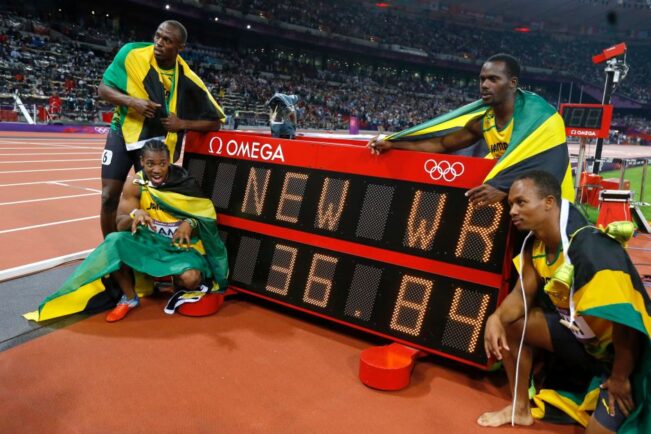
TEAMS | Together Everyone Achieves Most Success
The story is told of an anthropologist who introduced a game to the children of an African tribe. He placed a basket of delicious fruits near a tree trunk and told them: “The first child to reach the tree will get the basket.”
When he gave them the start signal, to his astonishment they were walking together, holding hands, until they all reached the tree. They simply shared the fruits and happily ate them! So baffled, with a furrowed brow he asked them, “Why did you do that when any one of you could get the basket only for yourself?”
They answered with glee, and to his amazement, “Ubuntu!”
“How can one of us be happy if all the rest are miserable?”
“Ubuntu” in their civilization means “I am because we are.” It is Xhosa from the African continent. The venerable Archbishop Desmond Tutu explains: “Africans have a thing called ubuntu. It is about the essence of being human, it is part of the gift that Africa will give the world. It embraces hospitality, caring about others, being willing to go the extra mile for the sake of another. We believe that a person is a person through other persons, that my humanity is caught up, bound up, inextricably, with yours. When I dehumanize you, I inexorably dehumanize myself. The solitary human being is a contradiction in terms. Therefore you seek to work for the common good because your humanity comes into its own in community, in belonging.”

The 4D assessment digs deeper beneath the tip of the iceberg of one’s behaviour as a leader, starting with in one’s unique place in TEAMS
TEAMS THEME LIKE A BROKEN RECORD
Together Everyone Achieves Most Success. The theme of teamwork just won’t go away! To those around me, I must’ve sounded like a broken record over the period. Ah! But broken record will soon take on another important meaning. Read on. It began a couple of weeks ago as I was finishing a write-up for our 4D assessment (image above) at YAW PERBI. The TEAMS portion of the assessment posits that TEAMS should consist of at least one each of a Theorizer, Executor, Analyzer, Manager and Strategist, that idea itself also forming another acronym for TEAMS. No one has all six. Even if they did, they wouldn’t be able to function optimally when all are needed simultaneously. Whatever you don’t have, the Creator has put in someone next to you in your ecosystem. A network is about nextwork, basically a net of next workers.
This became very apparent to me when over these same couple of weeks I happened to be reading the old jewish book of Nehemiah, the guy in diaspora who returned to Jerusalem to lead a rebuilding campaign. The dominant word in the text about the rebuilding is “next.” An array of people, from priests to perfume-makers, male and female, built the next session of the broken walls of the city, some right in front of their house, until walls that had been down for over a century were rebuilt in only fifty-two days! Indeed, teamwork makes the dream work!
Former U.S. President Lyndon Johnson put it another way, “There are no problems we cannot solve together, and very few that we can solve by ourselves.” Going east, the Chinese have a proverb too that says, “Behind an able man there are always other able men.”
BETTER TOGETHER, FOR SURE!
Again over these same couple of weeks, my mother-in-law forwarded a video to me, featuring a passionate speaker who was emphasizing the power of building together. Incidentally, I happened to know the man–pastor Forbes of The Gambia, whose church in Banjul I had the privilege of speaking at about a decade ago. I quickly sent him word that he was trending. And he was. Forbes made a terrific point about how the fastest man in the world remains Usain Bolt of Jamaica, with a 2009 world record he set at 9.58 seconds remaining unbroken by any other human being for a dozen years now. Yet the 4 x 100m relay record by Bolt and three others stands at 36.84s, meaning an average of 9.21 seconds per runner. Get that? That’s a whole 37 seconds better than the best man in the world! That’s the power of team work, of synergy. All of us together, are better than any one of us, even the best of us, any day!
Take the game of soccer too. It doesn’t matter what a great goalkeeper one is, no one wins the game without good strikers who score goals (not to talk of the rest the complimentary forwards and midfielders). In the same way, one may be the best goalscorer in the world but without a strong defence, including goalkeeping, you will be outscored and lose the game. Great leadership assembles a great team of diverse people in gender, ethnicity, age etc. but especially in thinking styles and task orientation.
Every team member has a place where they add the most value. You don’t want to put the best goalscorer as a goalkeeper or vice-versa. You’ve got to know yourself and where you have most value, in order to know where you lack and who to bring on board. Likewise, everyone else on the team should know their niche. In The 17 Indisputable Laws of Teamwork, John Maxwell puts this essential need to have the right people in the right places well on TEAMS as follows:
-
-
-
- The Wrong Person in the Wrong place = Regression
- The Wrong Person in the Right Place = Frustration
- The Right Person in the Wrong Place = Confusion
- The Right Person in the Right Place = Progression
- The Right People in the Right Places = Multiplication
-
-
IN THE END…
All of us together are better than the best of us, any day, every time! Even better than a Usain Bolt! Ubuntu! I am because we are. What is the Theorist without an Executor? What would an Analyzer do without a Manager or Strategist? TEAMS is the way to go. The children of Africa know it. Do we? Together Everyone Achieves Most Success!

Inspiring Practical Examples of the Integrated Life

Dinner with the organizing team of an annual conference in Halifax, Nova Scotia (Canada) at which I was a plenary speaker. If you look closely at the back left you will find my then seven-year old son and I. We did the 2,500km trip by road together.
After my last blog on Why I strive for work-life integration and not work/life balance, some got it and said, “important distinction.” Others thought it was just semantics, just a different choice of words but saying the same thing. I beg to differ.
Here’s another attempt to distinguish one from the other: work/life balance (apart from seeming to pit work against life) is the attempt to distribute time, energy and other resources equitably to all four buckets of life to ‘tick all the boxes’. On the other hand, work-life integration is radically different because it harnesses the power of all four buckets, making other buckets better by the power of other buckets. And it is living in such a way that one doesn’t have to hide the other buckets (say, on LinkedIn), pretend they don’t exist or be different things to different people in the different buckets. I’m quite certain a few poignant examples below may make the distinction clearer.
FACEBOOK AND FAMILY
Who doesn’t know about FaceBook and its 2.7 billion users. That number is the combined population of China and India, the two most populous nations in the world. 2.7 billion is more than twice the population of the entire continent of Africa! I was fascinated to learn that as founder/CEO, one of Mark Zuckerberg’s attempt at the integrated life in Facebook’s early days was to host FaceBook strategy sessions at his home on Monday evenings. And for Facebook’s COO Sheryl Sandberg, instead of missing dinner with her family, she would bring her children into the office. Here’s her testimony: “Facebook is incredibly family friendly, so my children were in heaven, entranced by pizza, endless candy, and the huge pile of LEGOs the engineers shared with young visitors. It made me happy my kids got to now my colleagues and vice versa” (George 2015, 173). I don’t know everything about FaceBook’s corporate culture, but these right here are great examples of the integrated life at FaceBook.
I’m proud of Databank in Ghana that has created a nursery in the workplace for nursing mothers as well as a quiet time room for staff to go and nourish their spiritual lives, especially after rushing from home at dawn in order to beat the crazy Accra traffic. These are laudable examples of the integrated life in corporate circles.
PERBI PRIDE
I love lions. I call my children cubs; not kids, hence we are the Perbi Pride. Last week, I handed over to the next CEO of ISMCanada after being at this role for eight years. One of the things I recalled at the handing over ceremony (and nearly everyone remembered) is how not long after I took the role I travelled almost the entire stretch of Canada (the second widest country on earth!) to get to personally know the staff and listen for the pertinent issues from the ground. What I haven’t told you yet is that as a family we decided to integrate our lives with my new work by making this a fun family trip. We rented a minivan and spent 30 days travelling from Montreal (on the east coast) to Victoria (beyond Vancouver) in the west. It was beautiful to see the different types of Canadian landscape and wildlife. Because our children our homeschooled, such opportunities are precious as ‘all of life is school.’ By the time we got back home we had clocked 13,000km and had enough geography, history, sociology etc. to last a lifetime! That is one of the best examples of the integrated life we’ve ever had as a family. Family did not get in the way of work or vice versa. We made both feed off each other and were the richer for it.
Over the last couple of years, I have adopted a tradition of travelling with one of the older four children. Just one, to make them feel special and have a one-on-one time with daddy. Don’t forget these are work trips for me and fun trips for them. After doing a Philadelphia and Washington DC road trip with our then four-year old she insisted upon returning home that “I’m Daddy’s travel buddy’ much to the chagrin of the others. I’ve been far from perfect in integrating family and work but I knew we were doing something right when my children got so used to the ISMCanada world that one day our then seven-year old son asked, “Will I become president of ISMCanada when I grow up?” Almost as if it were a family inheritance.
I’ve always worked from home over the last 8 years as CEO (or from an airport/airplane)–way before the rest of the world was forced to by the Covid-19 pandemic. Working from home and homing from work has its pros and cons but it certainly has helped more than harmed my work-life integration.
IMPACTING THE WORLD FROM WITHIN–‘AN INSIDE JOB’
In an article posted on the Harvard Business Review, author Stew Friedman rightly said that the most impactful leaders find ways “to integrate the different parts of their lives to reinforce and enhance each other.” Everywhere he looked he found successful individuals who used who they were as a person to influence how and why they worked. From Facebook COO Sheryl Sandberg (as I already shared above) through Michelle Obama to rock icon Bruce Springsteen, many influential people channel what made them a powerful person into creating a powerful product, service or project.
Take Michelle Obama, the 44th First Lady of the United States, for example. Michelle considers her daughters to be her first priority, even if this stance vexes those who would have her do more in seeking broader political and cultural change. However as Friedman rightly observes, in making sure her own children were receiving the most nutritious food possible, she began to advocate for better nutrition through the national initiative Let’s Move!. Her policies have won national and global acclaim.
One of the most impactful social enterprises in Ghana right now is the PerbiCubs Library Services, reaching 2,000 children in 200 schools. It might interest you to know that this did not start out as some mega altruistic attempt to ‘change the world’ through getting every child reading but out of our own family’s need for good, well-curated, reading level-appropriate books upon a long stay in Ghana. Whether it’s the Obamas or the Perbis, we’re running this for ourselves–we only get to scale and share with the rest of the world. If nobody signed on, we would still do it. It’s not just a job ‘out there’, it’s an ‘inside job,’ so-to-speak.
RUNNING MY FAMILY LIKE A CORPORATION
I’ve had partners complain about how their spouse is great at XYZ in the corporate world but doesn’t show even an iota of that competence or skill at home. There are those who might argue that they use ‘all of it’ out there and just want to chill and relax when they get home. While that might make some degree of sense, is it not inauthentic that who we are out there is different from who are at home? If you really believe in the power of vision and mission statements and values in your corporate world, for example, how come you haven’t couched one for your own family?
I’m learning to run my family like a corporation, in the sense of applying the things that have made organizations I’ve run succeed. Why not? Wherever two or three come together, you have an organization! I’m sure you can relate to how some of the most treasured members of your community, say church, actually are so because they bring their corporate skills to bear on the communal organization? On the flip side, I’ve also been the beneficiary of running businesses like family and seeing co-workers go over and beyond their job description and their contractual call of duty. The integrated life is the way to go.
CHOOSE INTEGRATION TODAY
“When you give your whole self to the moment, you not only benefit personally, but it dramatically impacts your business as well.” So says my mentor Bill George. The work-rest of life thing doesn’t have to be a zero sum game. Bill is right about how “Many leaders are reluctant to combine their work and family lives, but bringing the two together can lead to more productive and fulfilling lives, both personally and professionally” (173). I have seen and testify that it takes being open-minded about this work-life integration notion, hard work, creativity, experimentation, patience, much discomfort and many failures to make it work but when it does, it really does.
References
Friedman, Stewart D. 2014. “What Successful Work and Life Integration Looks Like.” Harvard Business Review. October 07, 2014.
George, Bill. 2015. Discover your True North. Hoboken, NJ: John Wiley & Sons.

Why I Strive for Work-Life Integration and not Work/Life Balance
Even as a boy, I felt there was something not quite right about hardly knowing my dad’s fellow partners and their families at the ‘big four’ accounting firm he worked at. Of course I knew a couple of the names and faces but that was about it. I felt they could organize some social events and such to intentionally bring their families together but hey, what did I know?
In fact, even now I wouldn’t be able to make out the wife of the senior partner when dad was deputy senior partner. The very kind, burly man’s children currently live barely five hours away from my family in the same country (Canada) but we don’t know each other well enough to even give the other an occasional ring. Oh wait, I got to talk to one of them once, when their dad was seriously ill and had been hospitalized in their town, but that’s been about it.
I think what I longed for, even as a boy, was a bit more of work-life integration, without even knowing that was actually ‘a thing’ or that such a term even existed. A feeble attempt at it has become largely known in the corporate space in recent times as “work/life balance” but what I speak of is more profound than that. How can anyone not see that there is a problem pitting “work” against “life” as if life doesn’t encompass work itself as well as one’s personal life, family and community? And it doesn’t have to be a zero sum game, work or die, inasmuch as there tends to be many tradeoffs.
BUY ONE, GET THREE FREE!
It’s a no brainer that having a bad home situation can adversely affect your professional performance and vice versa. Also, despite how stringent your personal health routines might be, your community relationships are a significant determinant of your mental and physical health, a 75-year study proves. Life is not as separate as we would like (or like to think). Somehow we know this when it comes to how something negative in one aspect of our life can spill over to botch another aspect but what if I told you that being a great dad can make you a better CEO or that the skills you use in your community can be a life-saver in some work project? Yeah, work/life balance isn’t the way to go; work-life integration is. I’ll tell you why.
Author Stewart Friedman concurs: “From years of studying people in many different settings, I have found that the most successful people are those who can harness the passions and powers of the various parts of their lives, bringing them together to achieve what I call “four-way wins — actions that result in life being better in all four domains.” These four domains Stewart speaks of are illustrated in ‘The Integrated Life’ diagram below. He continues, “My research has shown that there are ways for everyone — from the managers of sales teams, to executives in government agencies, to computer engineers, to florists, to coaches — to achieve professional success without always having to sacrifice the things that matter in their personal lives.”
COVID-19 BLESSING IN DISGUISE
One of the gifts of the COVID-19 pandemic has been to not only highlight how important the place we call “home” is, but how it is central to our children’s formal education and our own professional lives. Heck, we’ve even done community, like church, from home! Online. This is perhaps the most physically integrated most people have been in their entire work lives. And those of us who like to keep everything prim and proper with no drama have had a really hard time.
I do a fair bit of social media. I find FaceBook much more integrated in terms of all four aspects of life than say, LinkedIn. Several times, I have seen people literally apologize and “make an excuse” or “make an exception” to post something faith or family-related on LinkedIn. I’ve tried to push those boundaries myself sometimes but it’s a weird, I must say. When I recently shared on LinkedIn that I daily run the daycare at home for the youngest ones of our seven children, I was really honoured to have one of my mentors, Bill George (Harvard business school professor and former CEO of Medtronic), affirm me as follows: “Thank you, Yaw, for being the authentic leader you are.” This must be why: Bill really believes, “For authentic leaders, being true to themselves by being the same person at work that they are at home is a constant test, yet personal fulfillment is their ultimate reward. Doing so will make you a more effective leader in all aspects of life“ (George 2015, 16).
WHERE THE RUBBER HITS THE ROAD
At a just-ended eight-week Family Foundations Mastermind I hosted, the prime place of family was underscored over and over again but by the penultimate session we needed to ‘get real.’ How do we do family well while keeping a demanding job, juggling community roles and trying to stay sane? This is where the rubber hits the road.
As I’ve stated before, integrity comes from the Latin root integritas which means whole, entire, undivided. On the other extreme are those who completely separate their professional life from other aspects of their lives. Then there are those who in the name of work/life balance, hop from one of the four parts to the other, trying to “fulfill all righteousness” and tick every box with as little guilt as possible. What I subscribe to and strive for is integration. Bill is blunt: “To lead an integrated life, you need to bring together the major elements of your personal life and professional life, family and friends so you can be the same person in each environment” (159-160).
We’re striving for the word integrated rather than balance. Subtle difference, apparently, but HUGE. Stewart gets it: “The idea I think to replace work/life balance, which treats these categories as independent, is work/life integration. You’re treating yourself whether you’re at work or at play in basically the same way.”
BIG ROCKS FIRST
All the buckets don’t have the same weight. I believe we ought to carry the more important yet not always more urgent buckets of personal and family first, putting the big rocks in first as Stephen Covey would put it, and all the other things will be added to us as well. Easier said than done, but it must be done nonetheless.
My favourite corporate example of this is Nike CEO John Donahoe (former eBay CEO), when he was a consultant with Bain decades ago with a young family. I was most impressed about how he told his client, ”It is important to me to be doing this. I’m committed to working hard, but I can’t be there before 10am.” This is because he insisted on taking his children to school before heading to the client site. The result? Donahoe was amazed that his clients appreciated the choices he was making. “The client responded positively as he appreciated my commitment and contributions even more” he says. “I didn’t have the courage to think about it that way before. There’s an inclination in business to put on a tough exterior to give the impression that you have everything under control” (162).
Bill George reports that “Donahoe learned that the more he integrated his life and embraced his humanity, the more effective he became as a leader … by showing his team and clients his [priorities and] vulnerabilities, he discovered his teams performed better and his client relationships strengthened.” (162)
This is not to say it’s all easy; but it’s worth it–just like med school or doing an MBA. Hear Donahoe: “The struggle is constant, as the trade-offs and choices don’t get any easier as you get older. My personal and professional lives are not a zero-sum trade-off. I have no doubt today that my children have made me a far more effective leader in the workplace. A strong personal life has made the difference” (160).
To be whole (integritas), we need to integrate our personal , family, community and professional lives, not pit one against the other like ‘work/life balance’ suggests. Real life happens were all four meet and they can enhance each other. Indeed, they should. It isn’t easy. How do I know? I’m still trying. So should you. It’s worth it.
In my next blog, I will share a number of practical examples and ideas of how people have made life-work integration happen, and how my family and I have tried to, also.
References
Friedman, Stewart D. 2014. “What Successful Work and Life Integration Looks Like.” Harvard Business Review. October 07, 2014.
George, Bill. 2015. Discover your True North. Hoboken, NJ: John Wiley & Sons.

How to Leave the Dance Floor | Two Thoughts on Succession.

At the Pierre Trudeau international airport in Montreal, Canada, with two leaders, William and Emmanuel, who succeeded me as CEOs of The HuD Group in Ghana and Canada respectively. We had held a strategy meeting just before the COVID-19 pandemic seriously hit the Canada and the U.S..
In my last blog we discussed when to leave the dance floor as an executive leader. Today, let’s talk about how to leave the dance floor. I agree with those who prefer ‘succession management’ to the term ‘succession planning’ because planning, come to think of it, really is only a third of the management cycle which comprises planning, implementation and evaluation.
I have several succession management experiences in my leadership career spanning over two decades. These have been in multiple C-level roles and contexts, even in different countries and continents.
SUCCESSION SUCCESS STORIES
After pioneering The HuD Group in Ghana in 2003 and leading it for five years, I successfully passed it on to the next national CEO and left for Cote d’Ivoire to pioneer the same work of holistic leadership development there while serving with the United Nations peacekeeping operation. The Cote d’Ivoire transition, when it was time to leave after a year, was one of the trickiest. The very week I was to leave, the one person who had hitherto faithfully served alongside me and was the ‘heir apparent’ suddenly and strangely broke my trust in a significant way. The ‘next best’ I eventually handed over to, ended up being truly the best. Timothée led the organization for a decade and has now also successfully passed the baton to an amazing lady, Ann. Timothée is now the CEO of Francophone Africa for the same organization. We have been working together for over a dozen years. We do not only have a mentoring relationship but are really friends, having spent great times together in several African countries as well as in the U.S. and Indonesia. I have done the same kind of succession management in Canada, handing over The HuD Group I pioneered there in 2010 to a very capable young man who at the time was working for Shell in the oil sands of Alberta.
In a different scenario, although I was initially hired to be interim pastor of the English congregation of a Chinese church in Montreal, when it was time to get serious about handing over to a successor after about three years, several people did not want us to go that route. They liked me and had gotten comfortable with the progress we were making in several areas but I knew it was the right thing to do. As a leader, I had figured out that the church needed to find someone who could give their full attention to the work and not my part-time investment, albeit fairly substantial. That too was an interesting succession management process as it involved interviewing candidates from Canada, the US, Taiwan and the Philippines. It’s been about five years since we eventually hired a young trilingual Chinese-Canadian, Rev. Joseph Cherng, and the church has been thriving since he took over over from me. Again, he consults me from time to time and we are good friends, even visiting our home to share fellowship together with our spouses.
As I shared in the previous blog, I have just made my way off the dance floor after an eight-year tenure as president of ISMCanada and still in the midst of succession management even as I write this blog. I like the fact that in their statement to the organization, the board mentioned that I gave them a whole year’s notice of my stepping aside. That is how to do it–give ample time (unless, of course, it is an emergency). A recent meeting at ISMCanada had two former presidents (myself and Paul Workentine, who handed over to me in 2013) and the new president of ISMCanada (Jakob Koch) all in the same Zoom breakout room (picture below). All three of us still have roles in the organization concurrently. A blessed rarity!
Apart from leaving the dance floor when people are still enjoying your dance, there are two other mindsets that have helped me succeed with regards to succession management in the several leadership transitions in my leadership career in multiple roles and contexts First, “leadership success is measured by succession” and then, “always be closing.”
MINDSET #1: LEADERSHIP SUCCESS IS MEASURED BY SUCCESSION
One of the things that has helped me to be largely successful in all the above stories, even amidst challenges, has been a leadership jewel I picked from John Maxwell’s 21 Irrefutable Laws of Leadership about 20 years ago. According to John’s Law of Legacy, a leader’s lasting value is measured by succession. So unlike other leaders, and I’ve seen many such in Africa, who even want their successor to fail so that they look good, I have always viewed by success as a leader by how well my successor does. You don’t want your successor to look bad just so that you look good. That is bad leadership.
In all the above successful succession stories, my pride is in the fact that these subsequent leaders are doing well, even better than I did in me era. If really leadership is about the people we serve and the noble purpose we share, then any true leader would want to measure their success by a successful succession!
MINDSET #2: ALWAYS BE CLOSING
When I was a financial consultant with Investors Group Canada, I had a fascinating Italian gentleman called Carlo in charge of my unit. He was quite the mentor figure, doing some rounds with me and even taking me to his home on the east end of Montreal once. Carlo was a straight-shooter and his large clientele was evidence that he was doing something right. He is the guy who first taught me to ‘motivate and disturb’ in the sales process. But the most important thing he taught me about sales, I find applies to succession management as well. He called it ABC–Always Be Closing. That must’ve been his short version of Stephen Covey’s second habit of successful people: begin with the end in mind.
To Carlo, what was the point of all the prospecting, phone calling, presentation preparation, sales conversations etc. if it all these activities in the sales process don’t end up in a sale? But in order to close the sale in the end, one has to have that mindset and talk and behave as a closer right from the beginning of the conversation–even before the beginning–and throughout the conversation. ABC–Always Be Closing.
When it comes to succession management, I feel the same way. Always Be Closing. Right from taking a position or role, one needs to begin with the end in mind and start succession management. Always Be Closing. What if the day after you become VP or CEO you’re hit by a bus? What happens to your organization? Even barring any such tragedy, the reality is, every leader, no matter how good and gifted, will have to leave one day. No one and nothing lasts forever. From the very day I took on the CEO role at ISMCanada, I identified a possible successor and hinted him. Always be closing.
CONCLUSION
So succession management should be as basic a mindset and requirement as ABC for every would-be-successful leader. Beginning with the end in mind, Always Be Closing. And if one truly believes their leadership success is measured by successful succession, it will make all the difference in how they leave the dance floor. Leadership success is good, but significance because succession was successful, is even better!

When to Leave the Dance Floor.

Visiting the Kakum National Park in Ghana with my senior leaders, hailing from six different cities in Canada. Fun fact: the famous canopy walk at this park was built by two Canadian engineers, assisted by a Ghanaian crew.
This month I clocked eight years as president and CEO of a strategic Canadian charity in the international education space. I was headhunted for the role and felt privileged to be the first ever black president of our almost 40 years old organization. We provide hospitality, faith exploration opportunities and leadership development for the over half a million international students in Canada to be empowered to impact the world. I’ve had the privilege of leading about 90 incredible staff across 23 cities from coast to coast–Canada is the second widest country on earth after Russia–and oh yes, we have a staff family serving in Australia too.
SO WHY ARE YOU LEAVING?
In the first couple of years under my leadership, we grew by about 70% (short of my 100% goal) in new staff and new fields, expanding into about a dozen new cities, extending coast to coast for the first time in the organization’s history. There’ve been many more exciting things that have happened, including seeing such a rich diversification of our staff to about 15 nationalities. One of my greatest joys has been to see former international students becoming leaders of our work in cities, regionally and even in senior leadership. Every quarter we chronicle story upon story of incredible impact on students/scholars by staff and volunteers and impact of our students and alumni around the world, from Australia to Zimbabwe! We’ve seen an organization little known organization gain significant recognition in the international education space in Canada and abroad. Together with the leaders and staff, we worked to move organizational health from OK to healthy to flourishing (as independently adjudged by a third party firm). When I hear of CEO versus board tussles I cringe and thank God that this has been far from my experience. I’ve had such a congenial and synergistic relationship with the board, which has rotated through four chairpersons over the period I’ve been president.
If everything is going as well as I claim, then why am I leaving? My work is done! I believe every leader has a particular purpose to a particular people in a particular place for a particular period and when your work is done, you pack up and go, leaving the place and people better than you found them. I had initially been approached for this role in late 2012 and had laughed it off, especially since I was not only running The HuD Group, which had just received charitable status in Canada, but was also doubling as interim pastor for the Montreal Chinese Alliance Grace Church. Eventually I did take the five-hour flight from Montreal to Calgary to interview with the board. When Anyele and I prayerfully decided to make some adjustments and finally accept the board’s offer, I specifically stated that I planned to do this presidency for three to five years. In fact, I ensured it was clearly spelt out in the documentation. Well, guess what? It’s been three plus five years. It’s time to go!
MUSIC AND DANCING WITH GRAPHS
It is time to leave because my particular purpose to a particular people in this particular place for this particular period is done. As a wise saying in Africa goes, you leave the dance floor while people are still enjoying your dance. What Africans say so well idiomatically, Westerners tend to express graphically. So below is a pictorial illustration of what I’m saying.

Just before the peak is when your dance is still being enjoyed. That’s when you leave the dance floor.
While the above graph refers to the life cycle of any organization per se, it is similar to the organizational leader’s cycle too. Don’t wait to peak, let alone to get into decline and eventual death. That is not great for your leadership but even worse, not good for an organization you supposedly believe in (and even love). Just before the peak is when you collaborate with the ‘DJ’ (stakeholders) to start another song i.e. launch another initiative, start a new programme, launch a new organization etc. Just before the peak is when your dance is still being enjoyed so you either start another song or gracefully leave the dance floor!
By the time one hits the peak itself, you are stretching it. Folks are beginning to get tired of your moves. After the peak, it’s all downhill, babe! And no matter how hard you dance (in spite of how very tired you might be) no one’s excited anymore. Not only have eyes started rolling all the way into the head, some may even have begun yawning by now. Bored. Yet, some leaders still don’t get it! Whether it’s because of the adrenaline rush on the dash floor or the perks of the position, they keep dancing and dancing and dancing, while they keep losing the audience until the music is over! Some even keep dancing after the music is over, dancing to the music in their heads. It’s a fight together them off the dance floor! If you don’t leave the dance floor while people are still enjoying your dance, at least leave while the music is still playing! Worst case scenario, far from ideal, leave when the music is done.
A POLITICAL CONCLUSION
Knowing when to leave the dance floor is more of an art than a science; it’s a soft thing akin to discernment and intuition. The greatest leaders like Nelson Mandela have it; they just know. When everyone was urging Madiba to do a bonafide and very welcome second term in office as South Africa’s first black president who had had a good run, he declined. “No, please.” Nelson Mandela left the dance floor while we were all not only still enjoying his dance, we were urging him on for more moves!
Knowing very well that some leaders wouldn’t have what it takes to leave the dance floor even when it’s obvious, many spheres of society have term limits on executive roles. Most political jurisdictions have a maximum of two four-year terms. As an African, I’ve been embarrassed by how many of our leaders haven’t had what it takes to gracefully leave the dance floor while we were still enjoying their dance. Mandela, unfortunately, is more of an exception than the rule. As a former United Nations peacekeeping soldier, I’ve tasted first hand the horror of the ravages of civil strife and war when leaders don’t want to leave the dance floor even after the music is over. I hate it!
I join those concerned about the “pandemic of ‘third terminism‘” in Africa, including in the West African country I served in as a U.N. Peacekeeper from June 2008 for a year and lost two of my medical colleagues to death. Oxford defines ‘third terminism’ as the phenomenon of leaders seeking to break constitutional term limits—usually set at two terms in office—to secure a third term in office. The phrase has also been used more broadly to refer to leaders who refuse to leave power. This isn’t uniquely African; it is simply human. Recently, Putin has done it in the east and in the west, Trump did not want to leave the floor when his music was over. In fact, it was Franklin D. Roosevelt’s ‘third terminism’ (he won, even a fourth!) and the popular fallout about the concept of a long-term president that led to the ratification of the 22nd amendment in 1951 that “No person shall be elected to the office of the President more than twice…”
According to the National Constitution Centre, “Franklin Roosevelt wasn’t even the first Roosevelt to seek a third term in the White House. His distant cousin, Theodore Roosevelt, ran unsuccessfully as a third-party candidate in 1912, after declining to run in 1908. President Ulysses S. Grant also sought a third term in 1880, but he lacked enough party support to get a nomination.”
George Washington, the first U.S. president, had set the two four-year terms maximum precedent in 1796 when he declined a third term. In 1799, a friend urged Washington to come out of retirement to run for a third term. But as I earlier asserted, the greatest leaders know when to leave the dance floor–and stay off! Washington’s voluntary decision to decline a third term, like Mandela’s voluntary decision to decline a second, was apparently seen by many people as a safeguard against the type of tyrannical power yielded by the British crown during the Colonial era.
In my next article, I shall share about how to leave the dance floor in grand style (some call it ‘succession management’). In the mean time, you, my friend, now know when to leave the dance floor–at best when people are still enjoying your dance; or at least, while the music is still playing!

Integrity: it’s not that complicated.
One of the most sold yet least bought commodities in the leadersphere is integrity. There’s hardly a set of corporate core values one comes across without it showing up somehow. What’s even more intriguing is how mystical people make it sound and look. In fact, I’ve heard politicians throw it about in a way that’s made me wonder whether even I understood what the heck it is. But hear me good: integrity is not that complicated.
Although there are so many definitions of it, I’ll share with you one that is as simple as primary school math and then show you a simple litmus test of integrity. Integrity comes from the Latin root integritas, which means whole, complete, entire, unbroken. It’s the same word from which we get the word integer. See, I told you it’s as simple as grade school math! What are integers? Positive and negative whole numbers.
Integrity then basically means you’re whole, not divided. The opposite of that would be fractions; not whole. You’re fractionated, broken up.
What’s the litmus test I speak of? Integrity is not that complicated. How can you tell I’ve got it? How do I know you have integrity too? I don’t need a KYC (know your client) form or a testimonial from a referee or even your long list of impressive achievements. Integrity is keeping your word–not letting your word fall to the ground, not breaking your word. Integrity is being what you say you are and doing what you say you’ll do.
BEING WHAT YOU SAY YOU ARE
Let’s consider two guys, Kofi and Yaw. If Kofi says, “I lie, I deceive, I steal.” Kofi has low morality, by that particular society’s general standards of acceptable behaviour in that era. When Yaw says, “I abhor lying, I don’t deceive, I never steal,” he has high morality.
BUT, if Yaw goes on lying, deceiving and stealing then Yaw is not a person of integrity. He doesn’t keep his word. However, if Kofi goes ahead to lie, deceive and steal, although he has low morality he actually is a person of integrity (albeit in a very twisted way) because he keeps his word. He said he will do these things and he does. Integrity is being what you say you are, being what you say you will.
DOING WHAT YOU SAY YOU’LL DO
Again integrity is keeping your word, this time, by doing what you say you’ll do. I still remember the shock of a new friend I made when I showed up at her place exactly when I promised I would. She was brutally honest with me that she wasn’t expecting me to keep my word. I was hurt that he would think so lowly of the human race, more specifically the XY chromosomic Homo sapiens, and even more specifically a Christian gentleman. But you couldn’t blame here–she had experienced too many people promising and failing to deliver all too often.
Integrity is keeping your word. Of course, sometimes we give our word and due to extenuating circumstances we’re not able to keep it (we can’t control everything, especially the elements and emergencies). If you are a person of integrity, however, although you are not able to keep your word you still honour your word by reaching out in advance (preferably in advance), apologizing for not being able to and renegotiating to make things right.
My editing team for the weekly PEP Talks I do expect my videos to get to them by Sunday night each week. I had such a long day last Sunday that I realized there was no way I was going to be able to make a good video to send at the end of the day. To keep my integrity, however, I sent a note to the team saying, “Hey, it’s been a very tiring day and I wouldn’t be able to give this video my best shot. I’ll work on it tomorrow instead and send it to you.” I was unable to keep my longstanding word, but I did well to still honour it. I wish that were always true. Sometimes I’ve failed to keep my word and gone on with life as if I never gave my word in the first place. That is not integrity–not matter how much I claim to have it!
I get amazed how many people give their word with no intention whatsoever to keep it! And then there is the category of people who give their word intending to keep it but when they are unable to don’t see the big deal in still honouring their word–apologizing and redressing it. I’ve had to correct several people I work with to the point that now they not only keep their word, but if for some reason they are not able to, they now honour it by apologizing, letting me know and re-negotiating.
By the way, when we make plans and don’t keep it (even if they don’t involve anybody else), we violate our integrity. Many of us do not take our own word seriously; we don’t take ourselves seriously. I insist on 100% integrity with my coaching clients when they give their word about what they commit to doing in between our sessions.
Inasmuch as I want to keep this article to the personal level, I cannot help but take a swipe at politicians who are notorious for giving their word during political campaigns only to take office and not only fail to keep their word but sometimes even pretend they have no clue what the citizenry and civil society organizations are reminding them about and trying to hold them to account for! There is a joke about how before elections they call us “the masses.” When they win and we make our demands of them we become “them asses!” In my short lifetime, on both sides of the Atlantic, I have met very few politicians worth their salt. Politicians with integrity are almost extinct.
THE BOTTOMLINE
So integrity isn’t this highfalutin, mystical, metaphysical thing. It’s not that complicated. It is as simple as primary school math: integers. What shows you have it or not is as simple as keeping your word. Period. Nothing more, nothing less.

Another Sure Way to Destroy Your Leadership: Zero Accountability.
ONCE UPON A TIME
A number of years ago I was invited to do a keynote for one of the high profile speakers in a certain country. In our private conversations I expressed my deep concern about how an imminent divorce by another significant leader in the country was likely to have a really bad ripple effect on millions of people. In my naiveté I asked, “can’t anyone speak to him?” You know what the answer I got was? “WHO?” “WHO, Yaw, WHO?” In other words, there was no one high enough to hold this ‘big man’ accountable. Apparently, none of the ‘big names’ from around the world I felt might have the gravitas to make this man on a pedestal, rather on a precipice, answerable was worthy.
You see, this otherwise great leader had set himself up to fail by not putting in place relationships and structures to hold himself accountable and to bring him to book. Needless to say, the divorce happened and not only his family and organization but even the nation has not recovered since.
Last week I shared with you A Sure Way to Destroy Your Leadership (and Organization). Well, today I would want to share another sure way to destroy your leadership: not making yourself accountable. My favourite synonym for accountability is answerability. In the sad story I just shared, you could say there was no answer to the question of this big man’s answerability.
TODAY & TOMORROW, PERSONALLY & ORGANIZATIONALLY
Over the last few weeks, there have been significant allegations made against the leadership of a major church denomination originating from Ghana. Everyone I know who I thought was close enough to the denominational head has said to me, “No, I’m not.” The obvious ones, whether by family relation or organizational chart, who are positionally supposed to be in the inner circle are allegedly asking those pushing for a response and/or reform to “PRAY TO GOD TO SPEAK TO THE MAN because he is only accountable to God—no one else can counsel him, let alone question him!” WOW!
Not planning to be accountable is PLANNING TO FAIL—invariably you will, it’s just a matter of time. And principles are not respecter of persons. A survey of about 400 leaders who had all morally failed over a two-year period revealed that none of them had accountable relationships.
So organizationally, do not take lightly the power of a governance board. If you don’t have one, set it up—not a kangaroo board (for the show), a real one. Only last week the accountant of the Canadian charity I’ve been leading as president/CEO for the last eight years called me about a decision I had made to launch a very innovative fund, something that hadn’t been done in the organization’s nearly 40 years of existence. In her opinion this needed board clearance; I did not think that was relevant. Instead of trying to bulldoze my way as CEO and to remove every shadow of doubt, I immediately sent an email to the board chair and entire board presenting the issue to them and requesting a board vote electronically. Within a few hours, it was done. Imagine I had no accountability?
I even heard of a pastor whose church offerings are sent to his house after church. Only God knows the difference between what is taken to his house and how much ends up in the bank, if it ends up at the bank at all!
So organizationally, have a functioning governance board, but personally also, have an accountability partner. In fact, I have a friend who has a personal board which I am privileged to serve on, checking on him each quarter. My best friend of about 30 years is my accountability partner. Franklin was my best man is happens to be my brother-in-law as well. We meet monthly to keep each other accountable—we call it ‘FFF’, First Friday at Five.
The other day, our accountability time fell at a time when I was scheduled to fly out of the São Paulo-Guarulhos International Airport in Brazil. I remember so clearly the exact corner of the huge airport I was seated during that conversation because I recall the shock of my life I experienced, hearing from him. As it turned out, a very prominent member of the music industry had reported to him (Frank is an accomplished musician in addition to his I.T. career) that I was going after a married friend of his in the United Kingdom. I was like “WHAAAT?!” But Frank’s response flabbergasted me even more. He was laughing. Laughing! He laughed and informed me that he emphatically told the person that he must have the wrong guy because if it was really Yaw, he (Frank) would have already been voluntarily told by me! Wow!
Of course the allegation wasn’t true, but more importantly I had such a renewed sense of hope in the art and science of accountability and was energized even more to be 100% vulnerable and transparent with my accountability friend.
SWINDOLL’S ACCOUNTABILITY QUESTIONS
Everyone needs accountability about everything but particularly when it comes to the more common temptations of money, sex, power. In his book, The Body, Chuck Colson (who was imprisoned for his involvement in the Nixon Watergate scandal) lists these seven accountability questions used by Chuck Swindoll:
1. Have you been with a woman [any gender, really!] anywhere this past week that might be seen as compromising?
2. Have any of your financial dealings lacked integrity?
3. Have you exposed yourself to any sexually explicit material?
4. Have you spent adequate time in Bible study and prayer?
5. Have you given priority time to your family?
6. Have you fulfilled the mandates of your calling?
7. Have you just lied to me?
Church Smart Resources have compiled a comprehensive list of a number of accountability questions from different sources, including John Wesley. You may access it here.
“ACCOUNTABILITY” IS A LOVING WORD
I pity people married to unaccountable spouses. I have warned my emerging leaders: Don’t marry people who have no accountable relationships. You’re as good as dead if you do. Friends, we’ve got to have a paradigm shift and consider “accountability” as a loving word. It will save you and me many sorrows and preserve our lives and leadership. It might sound ridiculous to you if I told you I knew someone planning to fail. But I tell you, not having intentional accountability is invariably planning to fail, destroying your life and leadership. And guess what? Invariably, it happens. No matter how ‘big’ you are.

A Sure Way to Destroy Your Leadership (and Organization)

In the middle of doing a leadership development demonstration in Winnipeg, Canada with two of my favourite emerging leaders.
So the church split. I wish it hadn’t; indeed, it needn’t have. I tried to impress this upon the pastor in the centre of the brouhaha but to no avail. It did split. Why? The leader bit into the same thing that has destroyed many a leader, ancient and modern, male and female, irrespective of race, colour or socioeconomic status. Oh, and this isn’t one church split I speak of. I have witnessed quite a number–from the same root cause. Same as some landmark corporate meltdowns.
YOU WILL MESS UP
The truth is, as a leader you will mess up (you’re already messed up, anyway). The fascinating thing though is that in itself isn’t what will destroy your leadership. In fact, if that were the case, there would be no existing leadership anywhere at all because ‘all have sinned and fall short of God’s glory.’
Precisely because we’re all messed up, team members and followers (all pretty messed up too) are very willing to forgive leaders and find the best way to move on if and when these leaders recognize they’ve messed up and ‘fess up.
What people cannot stand is a leader who refuses to say, “I am wrong, I am sorry, please forgive me” when they are found or caught in some kind of mess.
MY GURU WITH A GUN
The mentor who first brought this to my attention was himself, in 2009, got caught in a situation that really threatened to derail everything he had worked hard for and stood for all six decades of his life then. What happened was that John C. Maxwell received a handgun as a gift after a speaking engagement in Birmingham, Alabama, and placed it in his carry-on luggage. Airport security-wise, it really didn’t matter much as he flew privately back home. But then he then forgot about it as he was racing to catch a commercial flight to Dallas to speak a few days later. When he put his carry-on bag on the conveyor belt, airport security found the gun and immediately arrested him. In his own words, “I was arrested, handcuffed, and taken to jail, where I was fingerprinted and photographed. Needless to say, it opened my eyes to a world I’d seen only in the movies. I was glad when I posted bail and was able to leave.”
Did John mess up? You bet. Big time. But John not only quickly ‘fessed up, he publicly shared this embarrassing story himself in self-deprecating humour to those of us who are part of his John Maxwell Team (JMT). He even titled it “Stupid is as Stupid Does.” This is how he began:
I’ve done a lot of stupid things in my life. Early in my marriage I would win arguments with my wife, Margaret, and hurt her feelings really badly. I have made business moves that lost tens of thousands of dollars at a time. And I’ve made leadership decisions that led to failures for my organizations. But up until now, none of the dumb things I’ve done has gotten me arrested.
And then JM went about writing about it in SUCCESS magazine. It is one of the stories I believe he tells in his book Sometimes You Win, Sometimes You Learn. This posture and gesture has endeared to me and many many more.
WILL YOU FESS UP?!
As a leader, the worst thing you could do when caught in a wrong is first of all to deny it. The second worst thing is to dismiss it. And thirdly (the killer blow) is to double down. To double down is to dig one’s heels in, to “strengthen one’s commitment to a particular strategy or course of action, typically one that is potentially risky.”
Some people not only double down personally but also begin the spin machine organizationally, churning out one traditional news and social media story after the other . That is a sure way to finish your leadership. Take responsibility, ‘fess up for the mess up, otherwise you double down and you’re going down.
Recently, I wrote about how authentic leadership has nothing to prove, nothing to hide and nothing to lose. When the issue of popular Christina musician Sonnie Badu’s doubtful degrees came out, what did he do? He kept defending the dubious degrees and soon deteriorated into name-calling. It was all over the internet that he had said to his ‘detractors’ that he would pay them no mind because he was a lion and that “LIONS DON’T RESPOND TO FROGS.” Frogs!
LANDING THIS PLANE
Fellow leaders, it doesn’t matter whether it was a mistake or an indiscretion or something you even knowingly did. When you confess you will receive grace. If you don’t, well, disgrace. So when you mess up, ‘fess up, get up and let’s move on. The next time you hear I’ve done something stupid (we all will have our opportunity), don’t make excuses for me or come up with a lame hashtag like #IstandbyYawPerbi. Remind me of this blog and encourage me to take response-ability to say, “I am wrong, I am sorry, please forgive me.” I won’t be a perfect leader; but I do know one sure way to lead to last.


